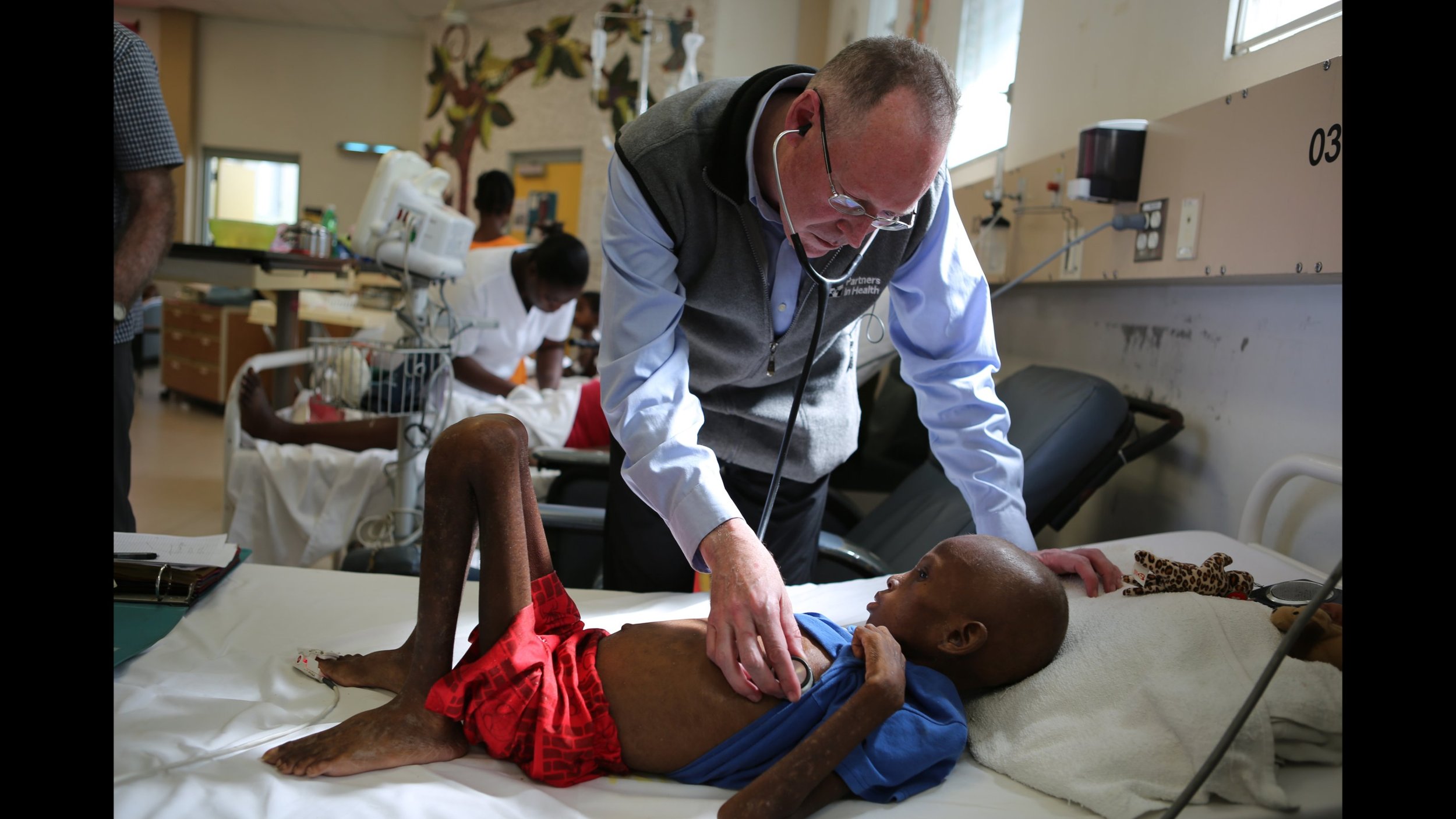PAUL FARMER -- THE MAN WHO WOULD CURE THE WORLD
CANGE, HAITI — 1990s — Each morning at dawn, for several months a year, Paul Farmer was up with the blinding tropical sun and heading for work.
A short walk from his home is the “miracle” that Farmer and fellow med students planted here a generation ago. Perched on the central plain of Haiti, where disease spreads as freely as the wild palms, stands a cluster of concrete buildings. A 104-bed hospital, a women’s health clinic, a lab, a blood bank, an outpatient clinic. . . Together they form a lifeline to health and hope called Zanmi Lasante.
In Haitian creole, Zanmi Lasante means “Partners in Health.” And when Farmer arrived on the job, dozens of partners — Haitian doctors, nurses, and community workers — were waiting. Farmer greeted his staff, talked about the day’s caseload, and the healing began.
In Mountains Beyond Mountains, Tracy Kidder wrote: “I may as well say that from the moment I saw Zanmi Lasante, out there in the little village of Cange, in what seemed to me like the end of the earth, in what was in fact one of the poorest parts of the poorest country in the Western Hemisphere, I felt I’d encountered a miracle.”
That was 20+ years ago. Since then, publicity, philanthropy, and savvy leadership have spread the miracle across what Farmer called “the nation of humanity.” Though Paul Farmer died in 2022, his Partners in Health now works in a dozen countries, from the huts of Lesotho to the hogans of the Navajo Nation. Wherever PIH works, miracles occur.
PIH can treat a TB patient in Siberia or a typhoid victim in Peru for a fraction of what it would cost in Chicago. PIH has lowered the rate of HIV/AIDS transmission, decreased infant mortality, and tackled diarrhea, typhoid, malaria. . . It’s all in a life’s work for “a man who would cure the world.”
Paul Farmer did not set out to be a doctor. Raised in a “free spirit” family of six kids, whose adventures took them from Western Massachusetts to trailer parks in the South, Farmer studied anthropology at Duke. But one summer, working with migrant laborers, he was charmed by Haitians picking tobacco. Graduating in 1983, he applied to Harvard Med School. While waiting to hear, he just had to see Haiti.
in Port au Prince, Farmer met a local priest who took him into the countryside. In the village of Cange, he found squatters suffering every disease imaginable. The nearest clinic was a day’s hike. Why wait for Harvard, he wondered?
“Physicians are the natural attorneys of the poor.”
For the next four years, Farmer studied at Harvard but did much of his bookwork in the field — the field in Haiti where he set up a small clinic. Soon he was going through airports, his luggage crammed with medicines. By 1987, he had recruited three fellow students, plus a British volunteer to whom he was engaged.
Farmer and Ophelia Dahl did not marry, but in co-founding Partners in Health, they sowed seeds of life together. Dahl was PIH’s executive director for 16 years and now chairs its board. And the PIH community health model has changed the healing of the world’s poor.
In 1998, the World Health Organization endorsed Farmer’s idea of “community health.” Along with its global campaigns, WHO began setting up small clinics employing local healers to work with, instead of against, traditional medicine. Community health acknowledged what Farmer proved in his book Infections and Inequality — that poverty breeds disease.
Farmer explained the link one day while hiking with Tracy Kidder seven-hours into the mountains of Haiti. Consider it a house call. “I can imagine Farmer saying he doesn't care if no one else is willing to follow their example,” Kidder wrote. “He's still going to make these hikes, he'd insist, because if you say that seven hours is too long to walk for two families of patients, you're saying that their lives matter less than some others', and the idea that some lives matter less is the root of all that's wrong with the world.”
Until his death, at age 62, Paul Farmer still worked half the year in Haiti, half in a Boston hospital, with millions of miles between visiting PIH clinics, WHO meetings, and more. When called a saint, he shrugged. “I think I have to work harder because a saint would be a great thing to be.” Still, although he was a MacArthur Fellow, a Harvard University Professor, a United Nations envoy, and “a man who would cure the world,” he preferred what people called him in Haiti. Doktè Paul.
“I have fought the long defeat and brought other people on to fight the long defeat, and I'm not going to stop because we keep losing. Now I actually think sometimes we may win.”














